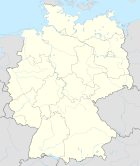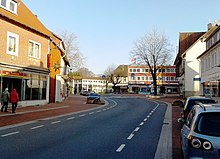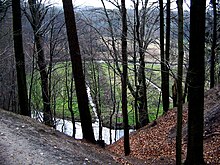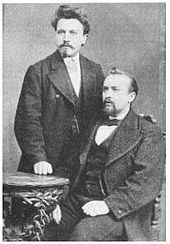Bad Fallingbostel
| coat of arms | Germany map | |
|---|---|---|
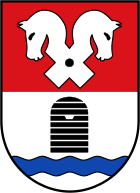
|
Coordinates: 52 ° 52 ' N , 9 ° 42' E |
|
| Basic data | ||
| State : | Lower Saxony | |
| County : | Heidekreis | |
| Height : | 67 m above sea level NHN | |
| Area : | 63.49 km 2 | |
| Residents: | 11,926 (Dec. 31, 2019) | |
| Population density : | 188 inhabitants per km 2 | |
| Postal code : | 29683 | |
| Primaries : | 05162, 05163 | |
| License plate : | HK | |
| Community key : | 03 3 58 008 | |
| LOCODE : | DE FAL | |
City administration address : |
Vogteistraße 1 29683 Bad Fallingbostel |
|
| Website : | ||
| Mayoress : | Karin Thorey ( independent ) | |
| Location of the city of Bad Fallingbostel in the Heidekreis district | ||
Bad Fallingbostel is the district town of the Heidekreis district in Lower Saxony . The city has been a state-recognized climatic health resort since 1975 and a state-approved Kneipp therapeutic bath since August 5, 2002. At the end of July 2015, the Kneipp therapeutic bath and climatic health resort was recognized by the Lower Saxony Ministry of Economics, Labor and Transport Revoked with immediate effect after the city council decided not to invest any more money in this area. The addition to the name “Bad” remains, as it has been protected as a grandfather after more than 20 years with the predicate.
geography
Geographical location
Bad Fallingbostel is located on the Böhme River in the southern Lüneburg Heath between Soltau and Walsrode in the Heidmark .
Garrison town
Close by is Europe's largest military training area ( NATO - Bergen military training area ) and barracks of the British Army (7th Armored Brigade) , etc. a. with the Royal Regiment of Scotland . In October 2015, the last soldiers of the British Armed Forces in Germany left their "Camp Fallingbostel" barracks. The buildings were used as refugee reception centers.
City structure
The town of Bad Fallingbostel consists of the following districts: Kernstadt, Dorfmark , Riepe , Vierde , Jettebruch and Mengebostel .
The core city is divided into the following districts:
- In the west: Idingen, Am Wiethop, Am Rooksberg
- In the north: Adolphsheide, Große Heide, Lehmhorst, Klint
- In the east: Ober- and Unter-Grünhagen
- In the south: Am Weinberg, industrial areas An der Autobahn, Pröhlsfeld, Oerbker Berg and Ost
Neighboring cities
|
Visselhövede 17 km |
Neuenkirchen 20 km |
Soltau 18 km |
|
Walsrode 7 km |

|
Osterheide 8 km |
|
Nienburg (Weser) 48 km |
Hanover 64 km |
Celle 47 km |
history

Fallingbostel was first mentioned in the year 993 as Vastulingeburstalle and can therefore look back on over 1000 years of history. Other earlier place names of Fallingbostel were in the years 1160 Vasteldingaburstolde, 1263 Valingheborstele, 1293 Valingeborstele and Valingheborstelde, 1295 Vellingesborstele, 1379 Valingborstele, end of the 14th century valinghborstelde, 1438ingborstel and 1438 Vallingborstele and 1438 Vallingborstele. The name element "-borstel" is one of the most common in north-west Germany . It is a combination of the Old Saxon “bur” for “house, dwelling, settlement, community” and Old Saxon “stal” for “place, place”. The first name "Vastila, Vastulo" probably belongs to "almost, firm", meaning "firm, strong".
Fallingbostel was originally a purely agricultural settlement, as agriculture was the livelihood of the inhabitants of the old Saxon Loingau for many centuries . The name Vastulingeburstalle means "place of residence of Vastulo" or "place of residence of the Vastulinger". At that time Otto III. established the borders between the dioceses of Hildesheim and Minden .
The Fallingbostel Bailiwick was established around 1300. Later called Amt Fallingbostel, it existed until the 19th century . In 1838 Heinrich von Quintus-Icilius , the assessor of the Bailiwick, founded the Fallingbosteler Sparkasse “Sparcasse für die Amtsvogtei Fallingbostel” as one of the first rural savings banks in the Kingdom of Hanover . It was one of the first rural savings banks in the Kingdom of Hanover. In 1866, districts were formed in the Prussian province of Hanover , including the Fallingbostel district . Fallingbostel received city rights on April 1, 1949.
On August 1, 1977, the counties were Fallingbostel and Soltau the Soltau-Fallingbostel merged. Fallingbostel became the seat of the new district, which was renamed the Heidekreis district in 2011.
Since 1975 Fallingbostel recognized climatic health resort since 1976 Kneipp - spa . On August 5, 2002, the name suffix Bad was introduced.
On October 15, 2012, there was a chemical accident in a nearby plant of the food manufacturer Kraft Foods , which is why a disaster alarm was called and several people were evacuated from the vicinity of the plant.
A merger of Bad Fallingbostel with the city of Walsrode and the municipality of Bomlitz to form the city of Böhmetal was planned for 2011 . In a public survey on November 2, 2008, this plan in Bad Fallingbostel was rejected by a clear majority. Almost 80 percent of voters spoke out against the merger, with a turnout of almost 62 percent. In Walsrode and Bomlitz there was approval (56.4% in Bomlitz and 53.8% in Walsrode) for the merger. The city council of Bad Fallingbostel therefore spoke out against the merger by a majority on November 10, 2008.
Incorporations
On March 1, 1974, the municipalities of Dorfmark , Jettebruch , Mengebostel , Riepe and Vierde were incorporated as part of the municipal reform.
religion
Protestant church
The majority of denominational Christian residents belong to the Evangelical Lutheran Church. There are two parishes in the city:
- Parish Fallingbostel with the St. Dionysius Church and 4912 parishioners and Friedenskirche in Bommelsen (former parish Bomlitz, since 2020 city of Walsrode) with 625 parishioners
- Parish Dorfmark with St. Martin's Church and 2,848 church members
You are looked after by three clergymen. Both churches are part of the parish of Walsrode in the Sprengel Lüneburg the Evangelical Lutheran Church of Hanover .
Catholic Church
The Catholic Christians in Bad Fallingbostel belong to the Roman Catholic parish of Saint Mary of the Holy Rosary , which was re-established in August 2004. The hitherto independent Catholic church of St. Mary in Bad Fallingbostel was doing with the Catholic neighboring municipalities of Saint Mary in Walsrode and the Holy Spirit in Benefeld (formerly municipality Bomlitz, since 2020 Walsrode) and Sacred Heart in Visselhövede the Catholic parish of Saint Mary merged . The rectory is in Walsrode. The parish is in the Verden deanery area in the Hildesheim diocese .
Other denominations
In Fallingbostel there are also Seventh-day Adventist and New Apostolic Churches .
politics
advice
The local elections on September 11, 2016 , September 11, 2011 , September 10, 2006 and September 9, 2001 led to the following results:
| Parties and constituencies |
% 2016 |
Seats 2016 |
% 2011 |
Seats 2011 |
% 2006 |
Seats 2006 |
% 2001 |
Seats 2001 |
City council election 2016
% 40 30th 20th 10
0
30.00%
34.81%
6.63%
5.05%
9.62%
11.59%
Gains and losses
Only lists that have seats on the Council are taken into account. |
|
| CDU | Christian Democratic Union of Germany | 30.0 | 8th | 34.77 | 9 | 45.78 | 14th | 44.30 | 14th | |
| SPD | Social Democratic Party of Germany | 34.81 | 10 | 34.24 | 9 | 41.92 | 12 | 41.70 | 13 | |
| GREEN | Alliance 90 / The Greens | 6.63 | 2 | 10.27 | 3 | 4.48 | 1 | 3.67 | 1 | |
| FDP | Free Democratic Party | 5.05 | 2 | 1.25 | 0 | 5.56 | 2 | 6.73 | 2 | |
| LEFT | The left | 1.43 | 0 | - | - | - | - | - | - | |
| AfD | Alternative for Germany | 9.62 | 3 | - | - | - | - | - | - | |
| ALFA | Alliance for progress and awakening | 0.87 | 0 | - | - | - | - | - | - | |
| BLBF | Citizens' list for Bad Fallingbostel | 11.59 | 3 | 16.68 | 4th | - | - | - | - | |
| WLBF | Voting group Liberals for Bad Fallingbostel | - | - | 2.80 | 1 | - | - | - | - | |
| lux | Single applicant Hubert Lux | - | - | - | - | 2.26 | 1 | - | - | |
| Otherwise. | Others | - | - | - | - | - | - | 3.60 | 0 | |
| total | 100 | 28 | 100 | 26th | 100 | 30th | 100 | 30th | ||
|---|---|---|---|---|---|---|---|---|---|---|
| voter turnout | 53.02% | 49.25% | 56.65% | |||||||
mayor
On June 15, 2014 Karin Thorey prevailed in a runoff election against Rainer Schmuck (CDU, elected as an independent candidate), who had held the office since 2006.
- previous incumbent
- 2000–2006: Arnold Richter
- 2006–2014: Rainer Schmuck (CDU)
- since 2014: Karin Thorey (independent)
coat of arms
| Blazon : “The coat of arms of the city of Bad Fallingbostel shows two crossed, outward-facing silver (white) horse heads in the divided shield above in red; below in silver (white) a black beehive, underneath a blue wavy line. " | |
| Justification for the coat of arms: The horse's head can traditionally be found on the gables of old Lower Saxony farmhouses. In addition to the Heide beekeeping, the beehive is a reminder of the founding of the “Sparcasse für die Amtsvogtei Fallingbostel”, which is one of the very first rural credit institutions in the Kingdom of Hanover to have the beehive under its seal. The waves point to the river Böhme, which runs through Bad Fallingbostel. |
Banner and flag
 |
Banner: "The banner is red and white striped lengthways with the coat of arms above the middle." |
 |
Hoisted flag: "The flag has red and white stripes with the coat of arms in the middle." |
Partnerships
Town twinning
Bad Fallingbostel has had a partnership with the Polish city of Miastko (German: Rummelsburg, see above) ( Pomeranian Voivodeship ) since 2000 and with the French city of Périers ( Normandy region ) since 1989 .
Sponsorship
Bad Fallingbostel took over the sponsorship for the city of Rummelsburg in Pomerania in 1963 . Every two years in Bad Fallingbostel the home district meetings of the Rummelsburg i. Pom. instead of.
partnership
In 1969 Bad Fallingbostel established a partnership with today's 2nd Close Support Battalion REME, which had been stationed in neighboring Oerbke since 1951 . In 1981 the REME was granted city freedom - "The Freedom of the Town". The granting of urban freedom goes back to an old British tradition. It shows the soldiers stationed on the spot in the form of trust by allowing them, with attached bayonets , i. H. "Sharp weapons" to march through the city. This happened for the last time on May 15, 2015, as the British military had given up the Oerbke site by the end of 2015. After 64 years, the REME left the heath.
Culture and sights

The Museum of the Archaeological Working Group is located in Bad Fallingbostel . V. In the megalithic park Osterberg boulders are exhibited which pushed ice masses from Scandinavia into the area around Bad Fallingbostel during the ice ages .
Further archaeological sights are the seven stone houses , which are five large stone graves about 5000 years old . They are located on the Bergen military training area (near Ostenholz) and were excavated by Karl Hermann Jacob-Friesen . There is also a Bronze Age grave in the Vierde district .
Also worth seeing are:
- the spa park with the boat station and the barefoot path on the Böhme
- the Heidmark court with Rummelsburger Heimatstube as a hall house in the Liethwald
- the Evangelical St. Dionysius Church in the city center
- the monument to Heinrich von Quintus-Icilius at the St. Dionysius Church, a German administrative lawyer and politician.
- the Evangelical St. Martins Church in Dorfmark
- the village fountain in Dorfmark
- the Löns grave of Hermann Löns in the Tietlingen juniper grove
- the grave of Erich von Manstein in Dorfmark
- the "Lieth", a near-natural mixed beech forest on steep slopes, some of which are similar to low mountain ranges, on the banks of the here strongly meandering Böhme . Many springs seep from the up to 40 m high slopes. The hiking trail to Vierde through the Lieth leads through the “Wolfsschlucht” and along species-rich meadows. On a plateau above the gorge is the "Freudenthal monument" in honor of the poets Friedrich Freudenthal and August Freudenthal .
Architectural monuments
Regular events
Between 1997 and 2002 demo parties of the computer scene took place in Fallingbostel under the name Mekka & Symposium .
Economy and Infrastructure
Companies
The largest private employers in the city are the production facility of Mondelēz International , where mainly dairy products are produced, and a production facility of Eckes AG . The location is used by Michelin , Edeka and DB Schenker for logistics purposes.
traffic
Bad Fallingbostel has two train stations (Bad Fallingbostel and Dorfmark) on the Heidebahn from Hanover to Soltau. In 1896 the first passenger train reached Fallingbostel.
Fallingbostel is on the motorway A 7 between the triangle Walsrode and the Maschener cross . There are motorway exits both in Bad Fallingbostel and in the Dorfmark district. The federal highway 209 leads to the federal highway 7 in the urban area, the federal highway 440 in the district Dorfmark. State road L 163 runs through the city.
Aid organizations
- Bad Fallingbostel volunteer fire department
- Dorfmark volunteer fire department
- Riepe volunteer fire brigade
- German Red Cross Local Association Bad Fallingbostel
- German Life Saving Society, local branch Fallingbostel
Personalities
sons and daughters of the town
- Friedrich Freudenthal (1849–1929), local poet
- August Freudenthal (1851–1898), local poet
- Kurt Heinrichs (1894–1971), administrative officer, district president of the Aurich district
- Helmut Schlüter (1925–1967), trade unionist and politician (SPD), Member of the Bundestag
- Helga Jansen (1950–2010), social economist and politician (SPD), member of the Bremen citizenship
- Christoph Künkel (* 1958), Lutheran theologian, senior church councilor of the Evangelical Lutheran Church in Hanover, spokesman for the board of the Diakonisches Werk Evangelical Churches in Lower Saxony
Personalities who have worked in the place
- Rudolf Bäumer (1870–1964), landscape and heather painter
- Friedrich (Fritz) Gansberg (1871–1950), German writer, elementary school teacher and reform pedagogue
- Erich von Manstein (1887–1973), Field Marshal General; buried in Dorfmark near Fallingbostel
- Heinrich von Quintus-Icilius (1798–1861), administrative lawyer; a statue was erected for him in Fallingbostel
- Walther Schultz (1900–1957) Regional Bishop of the Evangelical Lutheran Church of Mecklenburg in Schwerin during the National Socialist period and pastor in Bad Fallingbostel from 1950 to 1952
- Hans Stuhlmacher (1892–1962), teacher, Wehrmacht officer and local researcher; Hans-Stuhlmacher-Strasse in Bad Fallingbostel was named after him
literature
- Wolfgang Brandes: Chronicle Fallingbostel: 1930–1995. City of Fallingbostel, Fallingbostel, 1996.
- Gernot Erler , Lothar Klimek : Soltau-Fallingbostel. New insights into an old cultural landscape of the Lüneburg Heath. Gronemann, Walsrode 1995. ISBN 3-00-000174-3
- Wilhelm Westermann: local chronicle of Fallingbostel. Geiger, Horb am Neckar 1987. ISBN 3-89264-079-3
- Urs Hochsprung: Fallingbostel through the ages. Geiger, Horb am Neckar 1986. ISBN 3-924932-65-4
- Martina Neumann: 135 years of sports history in the Soltau-Fallingbostel district. District Sports Association Soltau-Fallingbostel, Fallingbostel 1996
- Arno Schmidt : From the life of a faun . Rowohlt Verlag, Hamburg 1953 (first edition with a dedication to Alfred Andersch ).
Web links
Individual evidence
- ↑ State Office for Statistics Lower Saxony, LSN-Online regional database, Table 12411: Update of the population, as of December 31, 2019 ( help ).
- ↑ Greeting on the website of the city of Bad Fallingbostel
- ↑ StBA: Changes in the municipalities in Germany, see 2002
- ^ Jürgen Udolph (research): The "place name researcher". In: website NDR 1 Lower Saxony . Archived from the original on December 28, 2014 ; accessed on August 3, 2019 .
- ↑ Article on FR-online.de ( Memento from April 9, 2014 in the Internet Archive )
- ^ Federal Statistical Office (ed.): Historical municipality directory for the Federal Republic of Germany. Name, border and key number changes in municipalities, counties and administrative districts from May 27, 1970 to December 31, 1982 . W. Kohlhammer, Stuttgart / Mainz 1983, ISBN 3-17-003263-1 , p. 225 .
- ^ Website of the city - result of City Council Bad Fallingbostel 2016 , accessed on November 2, 2017
- ↑ http://badfallingbostel.ftp.citywerk.net/KW2011/index.html
- ↑ http://www.badfallingbostel.de/staticsite/staticsite.php?menuid=165&topmenu=139
- ↑ Bad Fallingbostel coat of arms
- ↑ Main statutes of the city of Bad Fallingbostel
-
↑ Giant graves in the Lüneburg Heath. In: The Bern Week in words and pictures . Vol. 27, 1937, pp. 768-769. ( e-periodica )
